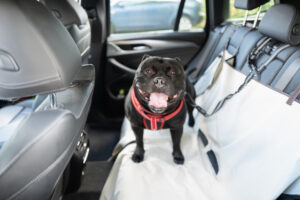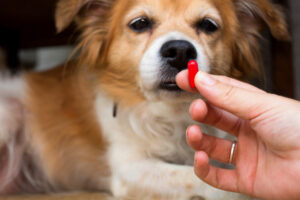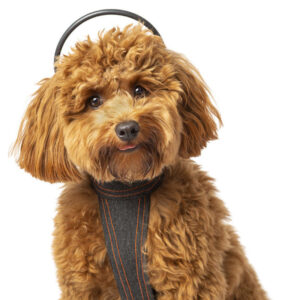Your Guide to Managing Canine Car Anxiety
Car rides. Some dogs love them, others hate them. It’s hard to see your dog unhappy, but the alternative – leaving them behind while traveling – isn’t ideal either. So what can we do? And why do some dogs hate traveling so much? From simple tips and tricks to pharmaceutical and holistic options, we’ve got the answers to all your questions.
Symptoms of Car Anxiety
If your dog is averse to traveling in the car, you may notice any of the following symptoms:
- Shaking
- Panting
- Erratic activity (such as jumping from seat to seat) while in the car is in motion
- Potty accidents
- Excessive drooling
- Whining
- Barking
So, what triggers these symptoms? That all depends on the cause(s) of your dog’s anxiety.
Causes of Canine Car Anxiety
While the symptoms of car anxiety are relatively easy to spot, the causes can be harder to discern. With the help of your veterinarian, you can get to the bottom of your dog’s symptoms! Some of the most common causes of car anxiety include:
- Traumatic events: For some dogs, a negative association is at the crux of their anxiety. At some point, these dogs had a stressful experience in the car – whether that be an accident or a particularly stressful journey. If your dog associates traveling in a car with that stressful event, they can develop a negative association with car rides. This is exactly what happened to Igor, a six-year-old Newfoundland, after a traumatic round trip drive from Maryland to Tennessee.
- Unfamiliar environments: Some dogs may not enjoy car rides because they simply haven’t had enough experience in the car. Unfamiliar with their environment and unsure of what might happen next, these dogs may begin to act out.
- Chaos of traveling: While us owners prepare before we hit the road, dogs are left confused and sometimes caught up in the chaos of preparing for a trip. This drastic change from the dog’s routine can lead to confusion and anxiety.
- Reaction to the car’s motion: Some dogs have a bad reaction to the movement of the car, which can cause motion sickness. If your dog has motion sickness, they may fear car rides because they associate them with feeling sick. Alternatively, your dog might dislike the feeling of being off-balance and fear falling forward, backward, or side to side as the car starts, stops, and turns.
How to Help a Dog With Car Anxiety

The difficulties of traveling with anxious dogs can result in everything from mild irritation to very dangerous situations. While it is certainly unpleasant to have a dog have a potty accident in your car, the thought of a dog frantically jumping around a car is much more serious and can even cause car accidents.
For dogs with mild car anxiety, simple tricks and alterations to your routine can make all the difference. Work with your veterinarian or professional behaviorist to get to the bottom of the causes of your dog’s anxiety and use the following guide:
DO’S:
- Use a safety harness in the car
- Put your dog ina travel crate or set up a bed for them in the car
- Put familiar items and scents in your car, such as worn-in toys and blankets
- Give your dog a toy or bone stuffed with food or treats to be enjoyed during the trip
- Play calming music
- Make sure your dog gets enough exercise before car rides
- Introduce dogs to car rides as early as possible
- Consider putting your dog in the front seat if they have motion sickness; looking out the front window rather than a side window will help reduce the risk of sickness.
DONT’S:
- Keep a leash on your dog in the car
- Feed your dog right before traveling
- Let your dog see your frustration or anxiety
- Leave your dog alone in the car on a hot day
- Force your dog into the car
However, if your dog has more severe anxiety, making basic alterations to your travel routine might not be enough to put them at ease. So, in addition to this list of what to do and what not to do, your veterinarian might suggest a variety of behavior modification techniques.
Desensitization and Counterconditioning for Car Anxiety
Desensitization and counterconditioning are two important behavior modification techniques that are used together in order to resolve anxiety. While counterconditioning will help your dog learn that good things happen when they have to go in the car, with desensitization, you can slowly increase the amount of time your dog spends in the car, never pushing your dog to the point of panic. An experienced professional behaviorist or trainer will provide you with the most effective training techniques.
It’s all about making the car a safe, positive place to be! Start with short drives (desensitization) followed by some sort of reward, whether it be a walk, a treat, or both (counterconditioning). Always make sure to move at your dog’s pace! Over time, your dog will start to associate the car with these positive rewards and activities and they’ll become more comfortable joining you in the car.
What if Training Isn't Enough?
If implementing training techniques and adjusting how you prepare your dog for traveling isn’t enough to resolve their anxiety, your vet may recommend one – or a combination of – the following solutions.
Pharmaceutical Options for Car Anxiety
For more severe cases of car anxiety, medication can be helpful

— especially when used in conjunction with other training techniques and therapies. Your veterinarian or certified behavior consultant will guide you as you explore pharmaceutical options for managing your dog’s anxiety. Some of the most popular medications for car anxiety include:
- Benadryl and other antihistamines
- Sedatives such as trazodone and alprazolam (Xanax)
- Buspirone, an Anxiolytic
For dogs specifically suffering from motion sickness, your veterinarian may recommend anti-nausea medications such as Cerenia® (maropitant), Dimenhydrinate (Dramamine®), or Diphenhydramine (Benadryl ®).
Supplements for Car Anxiety
Calming supplements for dogs are believed to target neurotransmitters such as dopamine, oxytocin, endorphins, and serotonin, which help regulate mood and the autonomic nervous system. Many professionals recommend supplements for milder cases or early stages of anxiety. For more severe cases, supplements may be used alongside other therapies to help improve results. Some of the most common supplements veterinarians recommend for managing travel anxiety include Zylkene® and Purina’s Calming Care.
Pheromones for Car Anxiety
Dog-appeasing pheromone products such as Adaptil are frequently used to help manage canine anxiety. Available in both spray and collar form, dog-appeasing pheromones are commonly used to help dogs suffering from travel anxiety. Although pheromones are a great tool for preventing and managing anxiety, they will not treat the actual cause of your dog’s anxiety. This means that, once you stop administering the pheromones, your dog’s symptoms will return.
CBD for Car Anxiety
While Cannabidiol (CBD) is thought to help for a variety of different ailments, there is no conclusive evidence that it helps to treat travel anxiety. Like supplements and pheromones, CBD must be administered consistently in order to have any effect. Ask your veterinarian if they think CBD is a good fit for your dog.
Compression Wearables for Car Anxiety
Another popular drug-free option for managing car anxiety are compression wearables. These garments have been shown to reduce heart rate, which is an indicator of anxiety.
Calmer Canine: A Drug-Free Solution to Travel Anxiety
 Calmer Canine®, proven to dramatically reduce canine separation anxiety, has also helped countless dogs suffering from car anxiety. Calmer Canine achieves this by using targeted pulsed electromagnetic field (tPEMF™) therapy to reduce inflammation in the amygdala – the exact location in the brain that processes those involuntary fears and anxieties associated with travel phobia. Over time, Calmer Canine minimizes this inflammation in the brain, calming your dog’s overwhelming emotions and bringing them below their threshold. This means that your dog will be in a more relaxed state, which will make it more likely that any behavioral techniques implemented will be effective and long-lasting.
Calmer Canine®, proven to dramatically reduce canine separation anxiety, has also helped countless dogs suffering from car anxiety. Calmer Canine achieves this by using targeted pulsed electromagnetic field (tPEMF™) therapy to reduce inflammation in the amygdala – the exact location in the brain that processes those involuntary fears and anxieties associated with travel phobia. Over time, Calmer Canine minimizes this inflammation in the brain, calming your dog’s overwhelming emotions and bringing them below their threshold. This means that your dog will be in a more relaxed state, which will make it more likely that any behavioral techniques implemented will be effective and long-lasting.
Next Steps for You and Your Pup
If you think your pet is suffering from car anxiety, the sooner you start tackling the issue, the better! You’ve got all the information you need right at your fingertips, so what are you waiting for? Call up your veterinarian and get going on a treatment plan for your pup today!
